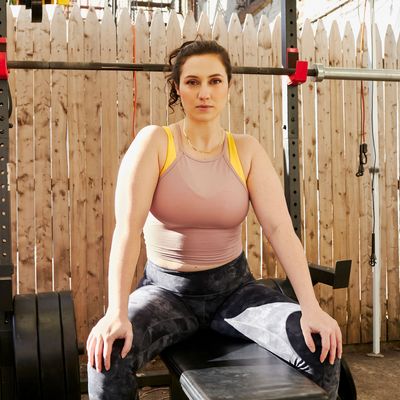
I wish I could say that I got into lifting weights because I wanted to be strong. I wish I could say I had reached ultimate enlightenment and detachment from my corporeal form, that weight and size were nothing but numbers. I wish I could say that I not only didn’t fear being bulky but embraced and desired it; that I wanted to enter the room shoulders and biceps first because I only fit through the door sideways. In truth, I just wanted abs. I wanted to be a size small. I also wanted all of this to be easy, and every other workout I tried only got endlessly harder.
Intensity intervals had failed me. The seven-minute workout was both too hard and not hard enough. I didn’t want to do any more Pilates or barre or yoga. Every form of exercise I’d tried had promised me bliss and control and freedom from having to think so much about my body and how I was going to get its weight and size under control. I found this not only to be a lie but to be the opposite of the truth: The more I did, the more I fretted about not doing enough and the less of an effect any workout seemed to have. Other than pushing myself harder, I didn’t know what options I had.
I was a runner for about seven years in hopes that someday I could run enough that my abs, and related self-assurance, would emerge. I went from running a couple of minutes at a time until I got winded and had to walk to running for 15 minutes at a time, then three miles, then five, then half-marathons. I ate my silly little low-calorie diet. I memorized calorie counts for certain foods — a banana, a slice of toast, a half-cup of carrots — until I could recite them like the alphabet. I shunned pasta and cookies and candy until I had to spend all my waking hours thinking about not eating them, so intense were my cravings. I watched the pounds go down, quickly at first, and felt like a wizard. Then they started to go down slowly and even more slowly. I was cold all the time. Even a space heater pointed directly at my feet couldn’t keep my toes warm. I couldn’t afford a second space heater for my fingers. I didn’t even remotely consider giving up; to me, failure could only be the result of not trying hard enough. A doctor never once expressed concern about me, my preoccupation with body fat, my lowish blood pressure, or my seeming clinical need to wear a scarf at all times.
I had kept digging the hole thinking I’d eventually unlock both “balance” and confidence. But I had finally outstripped my body’s biological capacity to do any more. I never reached a place where I delighted in constantly pushing through sweaty workouts and eating raw vegetables. Instead, I was left with only the meager set of “good” foods I was allowed to eat and miles of cardio that kept unraveling forever, like a clown unspooling silk scarves from its mouth.
It took me a few years and a lot of learning about muscles to understand what had really happened to me, but I’m going to try and explain: I always thought that if I dieted hard and long enough, my body fat would melt away to reveal my muscles underneath. What I didn’t realize was that too aggressive of a diet for too long would wear away at my muscles, too. This left me not only searching for muscles that were harder and harder to find but also biologically undermined me. My muscle was what kept my metabolism high, so the less I had from dieting, the less effective every diet was. My muscles were also what allowed my body to basically function — to move around and feel good. I couldn’t see that my muscles were being affected, which was maybe the most insidious part about the diet industry’s promises of weight loss; that vicious cycle would have kept me on the treadmill of restricting calories forever.
One day in 2014, when I was still looking for new ways to wrangle my body, I happened to come across an old viral Reddit post detailing one woman’s “six months of weight-lifting progress.” I had an abiding curiosity about what any activity might do to a woman’s body, and I had always heard “lifting weights makes you bulky.” But if anything, her photos showed she was smaller, her butt lifted, her abs slightly more visible, arms more toned. Sorcery? Magic? A special two-pound dumbbell? A new type of crunch or plank? Nope, just three heavy-lifting movements a day — squats or deadlifts, presses or bench, dips or pull-ups — three sessions a week. She was eating as much as she could. “No cardio,” she clarified over and over in the comments. “You Are Hot!” other redditors commented. “Thanks, but this is mainly about how I feel,” she responded, a potentially true-if-contradictory statement with the before and afters.
I ran my own stats through an “energy expenditure calculator” I found on the sub-Reddit, which churned out a figure for how much food I’d need to do a strength-building program. I boggled at the results. It was fully 50 percent more than I had been eating for most of my adult life. Nothing about it computed for my low-calorie, high-cardio brain. But I had trapped myself in a cycle of eating less food and doing more exercise just to keep my weight where it was; the only thing left to try was to throw it all into reverse.
While in principle I wanted to set the concepts of cardio and diets on fire and never look back, my icicle fingers turned clammy at the thought of actually giving it all up. I became even more nervous when, after my first workout of squats, deadlifts, and overhead presses, I didn’t even break a sweat. I hovered at the gym door, feeling unentitled to leave without some display of effort: a crumb of exhaustion, a tingle of muscle cramps. But within 45 minutes, a hunger rose up in me I’d never felt before, and I went to the bodega and swept an armful of foods off the shelves — a protein shake, a candy bar, a Vitamin Water (with sugar, thanks), Flamin’ Hot Cheetos, plus a bacon, egg, and cheese on a roll for good measure — and sat in bed and ate them all.
I was extremely afraid to let go of “burning calories” for fear that all the weight I’d fought to lose would come rushing back. But one of the central principles of lifting was that I needed to reserve my energy and not spread myself too thin; I weaned myself off runs until I was constrained to a five-minute warm-up around the block before my 30 minutes of lifts. I waited on edge through my rest days when my muscles were supposedly repairing themselves with my calories and protein, haunted by visions of pounds piling on. I told myself I would give it a month, that even in a month I couldn’t gain more than a few pounds.
And then … nothing happened. Nothing happened except that I got stronger. As instructed, I added a few pounds of weight to every lift every session, I ate my food, and I rested. The little muscle I’d had and accidentally destroyed with dieting was rising from its disordered eating grave. I was no longer gripped by cold. I ran hot, even. And moving around had become easier: bending down, carrying groceries, moving boxes around in the storage crawl space beneath my apartment. And I loved heavy lifting. I loved doing only five reps at a time. I loved sitting on my ass for a whole minute between sets, gawking around the gym, “gearing up for the next set,” feeling like I was getting away with something. To the casual observer, absolutely nothing had changed, but I had never felt better in my entire life. I didn’t know I could feel so different.
Two years passed, and I could no longer keep getting stronger just by eating enough to keep my weight the same and expect to add pounds to my lifts every session. To keep going, I would have to deliberately eat more and gain weight to keep building muscle. I considered my options; so far, the strength process hadn’t misled me. I strapped into a caloric surplus, eating the equivalent of a whole extra box of Annie’s macaroni and cheese a day, and a new program that added more reps and sets and types of movements to grow my muscles. My weights in the gym shot up, and my workouts that had become frustratingly hard became blissfully easy again. I gained ten more pounds and felt like a god, both in terms of strength as well as literally never having felt more confident, more proud, or more at home in the body where I lived.
I look back now at the photos of myself before lifting, and the sunken eyes and protruding bones leap out at me where before I only saw a body that still, even then, felt too large. I know that person would think I was fat now, and I don’t even need her to know she is wrong, in part because she wouldn’t hear it, but more so because I know that’s all she has, and now I know there is so much more. I had thought that “cravings” and “bad” foods and striving to eat as little as possible were just facts of adult existence, particularly as a woman. But just trying to eat enough to support my lifting slowly unraveled for me how widely shared, carefully crafted, and viciously protected those delusions were. Building back muscle was a much slower process than I ever realized; even as a new lifter, one pound of muscle a month was as much as I could expect to get. As I regained strength, I came to realize that whatever I had needed to be protected; what I had lost turned out to be critical to the experience of living in my body.
When I first started lifting, other women trying out strength training would reassure me that “you don’t have to worry about getting bulky.” But now I know that I didn’t have to worry not because it would never happen — I didn’t have to worry because becoming bulky would be the best part.
In the U.S., the National Eating Disorders Helpline is 1-800-931-2237.




